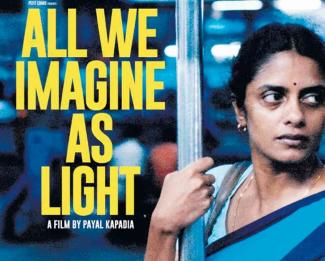These are complicated times, in a city like Mumbai one has to continuously struggle just to remain afloat. Over and above these, dhandha, dalali, politics of the meanest kind inevitably intrudes into everyone’s lives. In Payal Kapadia’s film ‘All we Imagine as Light’, Parbati is one of the three main characters whose husband used to work in a textile mill. Gradually the mills closed down, workers no longer come from Ratnagiri to work in the city. The city metamorphoses from a city of the organised working class, militant trade unions to one of malls and multiplexes. Parvati’s husband dies and the local Dada pesters her to vacate the plot on which she is living. But Parvati won’t budge, she has been living there for 22 years, she says, all the neighbours know her. But she has no kagaj, without it she has no existence, she may just vanish and no one will know. She looks through the window of a ramshackle cafe and wonders at the sky-kissing towers zooming up, the speed with which these promoters are going up they may soon reach the gods, she wonders.
‘All we Imagine...’ has been awarded the Grand Prix award at the much esteemed Cannes film festival. Earlier Chetan Anand’s ‘Nicha Nagar’, based on Maxim Gorky’s ‘The Lower Depths’ had won the award in 1946; Satyajit Ray’s groundbreaking ‘Pather Panchali’ won the ‘Best Human Document’ award in 1956; Mrinal Sen’s ‘Kharij’ won the jury award in 1983. The last time the Indian contingent had something to cheer about was in 1994 when Shaji Karun’s ‘Swoyom’ was selected for the Palme D’Or prize. No wonder three decades after when Payal was awarded she wished that no Indian would have to wait another 30 years to win a prize at the prestigious festival.
Politics and the Personal is nothing new in Payal’s films. Politics is not merely meetings and rallies though there are snatches of it in her films, like the protest meeting against eviction in this particular film. But it is more evident when it suddenly emerges as a factor in the life of the protagonists. Anu’s affair with Shiaz is tense as it’s ‘love jihad’, Hindu girl in love with a Muslim boy. Anu says her family would never agree to their marriage, on the other hand when Shiaz invites Anu to their Chawl, he tells her to wear a burqa, ‘or else they will be screwed’, he warns. Shiaz is afraid, Always feel that I am putting you in trouble, he confesses. They move away from the city to a hamlet where searching for a secluded place they suddenly come across a grafiti ‘Azadi’.
Politics is more pronounced in Payal’s earlier film ‘A Night of Knowing Nothing’, which had won the prize for the best documentry film at Cannes. This film shows the protest movement against the installation of Gajendra Chouhan (who acted as Yudhishthir in ‘Mahabharat’) as the chairman of FTII (Film and Television Institute of India). Payal herself was thick into the movement for which she boycotted classes for four months and her stipend was also withheld. While the protests raged in the campus a student writes a love letter in which there is less love and more politics, the way students are being penalised for striking, muslim youth being handcuffed and taken to a police jeep, the realities around her, the dreams, fantasis which become surreal.
The story in the film revolves around Parvati and two other women, Prabha and Anu, who work as nurse. We have seen that the latter is tangled in an uncertain relation while the husband of the former is away in Germany, ‘the last time she phoned was one year ago’. Through all the vagaries of life the three women cling to each other, they find solace in each other, amidst a pitiless city which revels with its criss-crossing local trains, pouring rain, towering skyscrappers and the inevitable Ganapati Bappa. In the process the city itself becomes a character and lest we forget after the thumping victory of the Mahayuti its sprawling slums are now under Adani’s hammer. Is Parvati’s eviction the curtain-raiser for thousands losing their home and hearth in the days to come?
Payal’s empathy for life is evident both within and outside her film. While receiving her award in her acceptance speech she thanked the workers without whose efforts and dedication the festival couldn’t have been a success. Incidentally the workers organised under the banner ‘The poverty behind the scenes’ were agitating on two demands - to increase their wages commiserate with the increase in working hours, and to recognise them as entertainment wage-earners. Strangely the film didn’t get any takers on the OTT platform. The show-timings at the malls were also odd.











